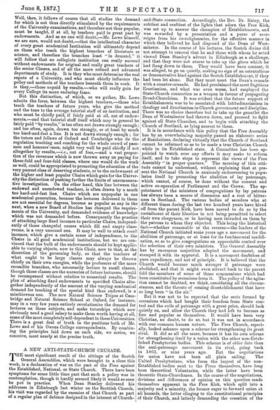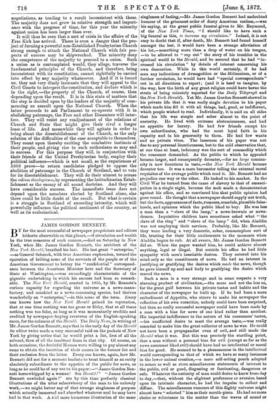A NEW ANTI-STATE-CHURCH CRUSADE.
THE most significant result of the sittings of the Scotch General Assemblies, which were brought to a close this week, is a declaration of war on the part of the Free against the Established, National, or State Church. There have been symptoms for some little time past that such a policy was in contemplation, though it hardly seemed likely it would so soon be put in practice. When Dean Stanley delivered his addresses in Edinburgh last winter on the Scottish Church, his visit was regarded by the enemies of that Church as part of a regular plan of defence designed in the interest of Church- and-State connection. Accordingly, the Rev. Dr. Rainy, the subtlest and craftiest of the lights that adorn the Free Kirk, was set up to answer the champion of Establishments, and was rewarded by a presentation and a purse of sove- reigns from his co-religionaries, for the effective manner in which they believed he had disposed of the Dean of West- minster. In the course of his lectures, the Scotch divine did not attempt to conceal that he and those with whom he acted viewed Dean Stanley's advent in Edinburgh as a challenge, and that they were not averse to take up the glove which he had flung down to them. They would have been content, it was alleged, to go on quietly, making no sign of an ostentatious or demonstrative kind against the Scotch Establishment, if they had been let alone. But they must meet the Dean's crusade with a counter-crusade. He had proclaimed the most flagitious Erastianism, and what was even worse, had employed the State-Church connection as a weapon in favour of propagating Broad-Churchism. It was evident that the future support of Establishments was to be associated with latitudinarianism in theology and Erastianistn in Church government and discipline. There was no choice therefore but to take up the gauntlet the Dean of Westminster had thrown down, and proceed to fight against all State Churches, and to begin with attacking the Church of Scotland, as lying nearest to them.
It is in accordance with this policy that the Free Assembly has by an overwhelming majority passed an elaborate series of Resolutions, declaring virtually that the Church of Scotland cannot be reformed so as to be made a true Christian Church while in its Established state. A Committee has been ap- pointed to watch over any efforts it may make to reform itself, and to take steps to represent the views of the Free Assembly "in proper quarters." The meaning of this atti- tude cannot be understood, without explaining that at pre- sent the National Church is anxiously endeavouring to popu- larise itself by promoting the abolition of lay patronage, which cannot, of course, be done without the consent and active co-operation of Parliament and the Crown. The ap- pointment of the ministers of congregations by lay patrons has always been a source of dissension and a root of bitter- ness in Scotland. The various bodies of seceders who at different times during the last two hundred years have hived off from the parent Kirk, have been moved to do so by the curtailment of their liberties in not being permitted to select their own clergymen, or in having men intruded on them by the patrons to whom they objected. This being the historical fact—whether reasonable or the reverse—the leaders of the National Church initiated sonie years ago a movement for the abolition of patronage, or at least for its fundamental modifi- cation, so as to give congregations an appreciable control over the selection of their own ministers. The General Assembly has by enormous majorities adopted the movement, and stamped it with its approval. It is a movement doubtless of pure expediency, and not of principle. It is believed that the Church would become much stronger if patronage were abolished, and that it might even attract back to the parent
fold the members of some of those communions which had been constituted by secessions from it. The policy of the agita- tion cannot be doubted, we think, considering all the circum- stances, and the threats of coming disestablishment that have so long been "in the air." But it was not to be expected that the sects formed by secessions which had bought their freedom from State con- trol and the evils of patronage with a great price, should look quietly on, and allow the Church they had left to become as free and popular as themselves. It would have been very Christian, no doubt, to do so, but it was not in accordance with our common human nature. The Free Church, especi- ally, looked askance upon a scheme for strengthening its great rival. It did so all the more, because it has its own scheme for strengthening itself by a union with the other non-Estab- lished Presbyterian bodies. This scheme is of older date than the anti-patronage movement in its rival, going back to 1863, or nine years ago. But the negotiations for union have not been all plain sailing. The United Presbyterians, who form the largest of the non- Established bodies next to the Frees themselves, have long been theoretical Voluntaries, while the latter have been theoretic State-Churchmen. In the course of the negotiations, divisions and differences of opinion on this question made themselves apparent in the Free Kirk, which split into a majority and a minority, the former eager to forward union at all hazards, the latter clinging to the constitutional principles of their Church, and latterly demanding the cessation of the negotiations, as tending to a result inconsistent with these. The majority does not .grow in relative strength and import- ance with the progress of time, for this year the minority against union has been larger than ever. It will thus be seen that a sort of crisis in the affairs of the Free Kirk has arrived. There is even a danger that the pro- ject of forming a powerful non-Established Presbyterian Church strong enough to attack the National Church with fair pro- pects of success may be shipwrecked. The minority deny the competence of the majority to proceed to a union. Such a union as is contemplated would, they allege, traverse the fundamental principles of the Church, and therefore, being inconsistent with its constitution, cannot rightfully be carried into effect by any majority whatsoever. And if it is forced -on, they not very dimly insinuate that they will appeal to the Civil Courts to interpret the constitution, and declare which is in the right,—the property of the Church, of course, then -depending upon the result. It is in this state of matters that the step is decided upon by the leaders of the majority of com- mencing an assault upon- the National Church. When the latter proceeds to ask Parliament to co-operate with it in abolishing patronage, the Free and other Dissenters will inter- fere. They will resist any readjustment of the relations of Church and State that might give their rival a longer lease of life. And meanwhile they will agitate in order to bring about the disestablishment of the Church, as the only solution of the difficulties of the case acceptable to themselves. They count upon thereby exciting the combative instincts of their people, and giving rise to such enthusiasm as may end in success. For this purpose they will, in conjunction with their friends of the United Presbyterian body, employ their political influence—which is not small, as the experiences of 1868 prove—to return candidates pledged to oppose the abolition of patronage in the Church of Scotland, and to vote for its disestablishment. They will do their utmost to arouse the odium theologicum, by representing the latitudinarian Estab- lishment as the enemy of all sound doctrine. And they will have considerable success. The immediate issue does not depend upon the members elected by Scotland alone, else there could be little doubt of the result. But what is certain is a struggle in Scotland of exceeding intensity, 'which will powerfully influence the political sentiment of the country, as well as its ecclesiastical.



































 Previous page
Previous page